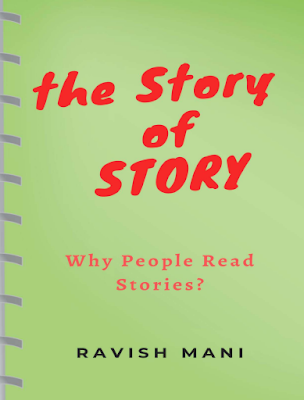A primer for fiction writers
Book review with a difference
Title: The Story of
Story: Why People Read Stories
Author: Ravish Mani
Foramt: PDF E-book
I want to get personal with
this review precisely because this is a book with a difference. First of all,
this book was written in a period of two days on a mobile phone. The author was
getting another book ready for submission to the Blogchatter E-Book Carnival.
But two days before the submission deadline, a lightning struck his house damaging
his laptop along with other appliances. The lockdown aggravated the problem. Ravish
Mani is not one to give up, however. He has a clear vision and sheer grit.
Picking up his smartphone, he started: I wanted to talk about how to make your readers forget the
sense of time, even the state of their being, & have blissful satisfaction
when they get absorbed in your story.
The first thing I admire about Ravish
is that unassailable spirit. The next is his idealism which is reflected in what
he calls “Uncopyright” according to which anyone can “copy, distribute, or
exploit any content of this book”. Ravish goes on to say that “morality cannot
be forced. It comes from within. For being moral, introspection is needed. No
law can make you morally right. It can only instil fear of punishment in you.”
He asserts his faith in magnanimity which will beget the same virtue. [I reviewed
Ravish Mani’s book published last year in this same Carnival which had a
similar copyright statement.]
This book is about story writing. It
is a good guidebook for those who wish to understand the nitty-gritty of
fiction writing. It initiates you into the fundamental elements of a story: conflict
(plot), characters, meaning (theme), and denouement (resolution of conflict arousing
empathy). Ravish looks at each of these very systematically within the little
space he is wielding. For example, how do you show the real character of a
person? Character is not revealed by the day-to-day activities of anyone.
Character is revealed in times of crises. How one responds to a crisis reveals
one’s character. Ravish takes examples from popular movies to illustrate the
point.
I have no doubt that the book would
have been a great resource for budding writers if only the lightning had not
struck down Ravish’s original manuscript. Even as it is, the book is a
significant beacon for beginners, a quick manual. It is much needed too, if you
ask me. Platforms such as blogs have made almost everyone a writer today. Even
those who haven’t read a single classical work turn out bestsellers nowadays.
Aspirations are great. Writing is a noble profession. But standards do matter
for every serious reader. People like Ravish help to sustain standards.
It should also be mentioned that
Ravish is a story consultant and manuscript analyst who provides his services
to writers who need them. Those who wish to avail of his services may contact
him. A lot of books published these days will do much better with some
professional editing.
Ravish Mani’s book can be downloaded here.
PS.
My contribution to the same book carnival is LIFE: 24 Essays. It can be
downloaded here.


I've downloaded his book and after reading about the lightning episode here, I'm even more keen to read it soon-ish.
ReplyDeleteHaven't dabbled in fiction yet, but one never knows.
You are a great story teller, Arti. I'd love to read your first story soon. And Ravish may inspire you to write it.
DeleteHari OM
ReplyDeleteYes, that's another added to my 'pile'... really need to work on creating the space for reading now! YAM xx
All the best with your lengthening list 😊
DeleteBravo to Ravish's determination!
ReplyDeleteIndeed.
DeleteI have known Ravish as a good writer. Your post has revealed a lot more of his human side too.Looking forward to read this book.
ReplyDeleteIt's a quick but rewarding read.
DeleteSo nice to know about the Ravishji's book... will read it... Thanks for the wonderful book review...
ReplyDeleteBest wishes
DeleteThe writing of the book is a story of resilience and your review is wonderful. I am already reading this book.
ReplyDeleteYes, Ravish's spirit is indomitable.
Delete